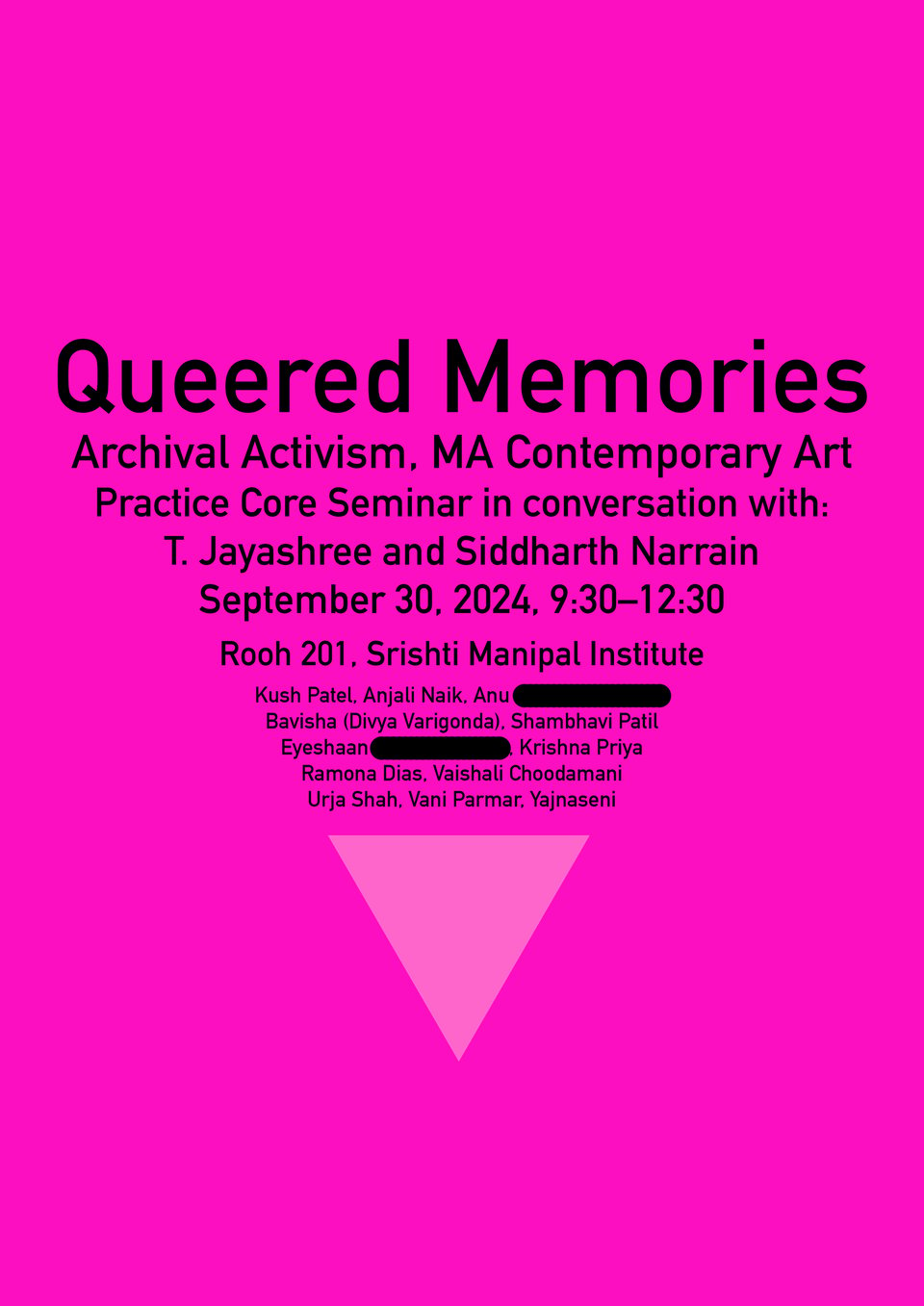Archival Activism
Felt Notes

ID: Poster, “Queered Memories: In Conversation with T. Jayashree and Siddharth Narrain,” Archival Activism, MA Contemporary Art Practice Core Seminar, September 30, 2024. Poster and image courtesy of Kush Patel.
This month marked the start of my seminar on archives and digital storytelling, which is a core offering in the Contemporary Art Practice Master of Arts program at Srishti Manipal. Specifically titled, “Archival Activism,” the abstract of my course is as follows:
In his opening to the 2017 Archives and Social Justice Symposium at the University of Michigan, archivist Paul Conway defined the archive as “simultaneously a method and a metaphor for defending social justice goals in a society that increasingly rejects the relevance of facts and the power of historical perspective” [1]. That facts or data connected to minoritized lives also remain intertwined with practices of classification and cataloging “requires,” in the words of librarian scholar-practitioner Emily Drabinsky, “queer critiques of hegemonic classification categories” [2]; that is, a disruption in how we make decisions pertaining to information curation away from seeing the produced record as stable or “finally corrected,” and towards its uncertain and dialogical construction in community.
This inaugural three-week seminar on “Archival Activism” will bring students of MA and MFA Contemporary Art Practice, MA Curatorial Practice, and MA Experience Design together in conversation with the ethics and politics of archival construction from a critical digital humanities perspective. Centering anti-oppression critiques, we will engage with both academic and public texts, projects, and technologies to structure reading, writing, and discourse building around two interrelated themes of justice and custodianship. Each theme will include core debates in queer and trans-feminist digital humanities that have contributed to our understanding of archives outside their received colonial norms.
The seminar will include guest visits to the classroom as well as visits involving local archive(s) in the city to help mobilize the concept of custodianship involving personal, community, and institutional settings. The final project and critical synthesis of prescribed reading materials may be located at these intersections to further the practice and imperative of “defending social justice goals” in more intimate terms.
As we’re entering the final week of this reading intensive, I find myself, yet again, emotionally full, reflecting on how I’ve actively sought safety with archives, and how these immersive engagements from the beginning of my graduate career in Michigan to the most recent and ongoing engagements with the Queer Archive for Memory Reflection and Activism (QAMRA) in Bengaluru remain oriented to the question of what constitutes a queer archive—and with what approaches, framings, and even expectations do archives, following the writings of feminist studies and queer studies scholar Anjali Arondekar, resist the colonial trap of “loss, scarcity, and erasure” of queer lives in the archive? [3]
Notes
[1] Paul Conway, “Open Seminar: Introduction,” Memory Work, Black Bodies, and Social Justice Symposium, Institute for the Humanities and University of Michigan School of Information, Ann Arbor (March 8, 2017).
[2] Emily Drabinsky, “Queering the Catalog: Queer Theory and the Politics of Correction,” The Library Quarterly: Information, Community, Policy 83, no. 2 (2013): 94.
[3] Anjali Arondekar, Abundance: Sexuality’s History (Hyderabad: Orient Blackswan Private Limited, 2023), 35.
About
Felt Notes are monthly dispatches about the work of the Just Futures Co-lab, and the co-labouring worlds of research and teaching in art, design, and the digital humanities that it scaffolds, furthers, and amplifies. The letter writing translates the ever so negotiated nature of this space at Srishti Manipal Institute and the discourse and scholarship on equity and justice I produce with students and wider academic and non-academic community members through critical pedagogy; archival and database constructions; interactive digital storytelling; and inquiries into queer-feminist media technologies and infrastructures.
I hope reading this letter and its upcoming segments are a meaningful experience for you. If you aren’t subscribed yet, you may do so here. If you are already subscribed, I would love for you to share the link with friends and trusted networks as we make sense of our relationships to technology as well as our relationships to each other via technology. If you would like to write or co-write a letter in the future or share any announcements, please feel free to get in touch with me, and whilst you’re here, please also check out the Felt Notes Archive.
Kush Patel